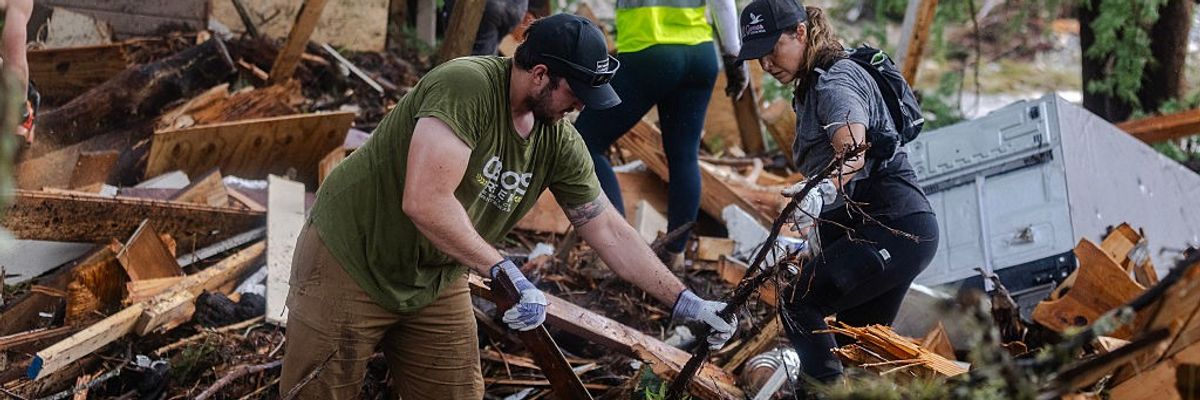As the death toll from catastrophic flooding in Texas continued to rise, climate scientists this weekend underscored the link between more frequent and severe extreme weather events and the worsening climate emergency caused primarily by humans burning fossil fuels.
Officials said Sunday that at least 69 people died in the floods, 59 of them in Kerr County. Of the 27 missing girls from Camp Mystic—some of whom were sleeping just 225 feet from the Guadalupe River when its waters surged during flash flooding Friday—11 are still missing.
While some local officials blamed what they said were faulty forecasts from the National Weather Service—which has been hit hard by staffing cuts ordered by the Trump administration's Department of Government Efficiency in line with Project 2025—meteorologists and climate scientists including Daniel Swain of the University of California, Los Angeles have refuted such allegations, citing multiple NWS warnings of potentially deadly flooding.
However, some experts asserted that vacancies at key NWS posts raise questions about forecasters' ability to coordinate emergency response with local officials.
Climate scientists do concur that human-caused global heating is causing stronger and more frequent extreme weather events including flooding.
"This kind of record-shattering rain (caused by slow-moving torrential thunderstorms) event is *precisely* that which is increasing the fastest in a warming climate," Swain wrote in a statement. "So it's not a question of whether climate change played a role—it's only a question of how much."
As Jeff Masters and Bob Henson wrote Saturday for Yale Climate Connections:
Many studies have confirmed that human-caused climate change is making the heaviest short-term rainfall events more intense, largely by warming the world's oceans and thus sending more water vapor into the atmosphere that can fuel heavy rain events. Sea surface temperatures this week have been as much as 1°F below the 1981-2010 average for early July in the western Gulf [of Mexico] and Caribbean, but up to 1°F above average in the central Gulf. Long-term human-caused warming made the latter up to 10 times more likely, according to the Climate Shift Index from Climate Central.
"The tragic events in Texas are exactly what we would expect in our hotter, climate-changed, world," Bill McGuire, professor emeritus of geophysics and climate hazards at University College London, said Saturday. "There has been an explosion in extreme weather in recent years, including more devastating flash floods caused by slow-moving, wetter, storms, that dump exceptional amounts of rain over small areas across a short time."
Instead of taking action to combat the planetary emergency, the Trump administration is ramping up fossil fuel production while waging war on clean energy and climate initiatives. The so-called One Big Beautiful Bill Act signed into law by Trump on Friday slashes the tax credits for electric vehicles and other renewable technologies including wind and solar energy that were a cornerstone of the Biden-era Inflation Reduction Act.




